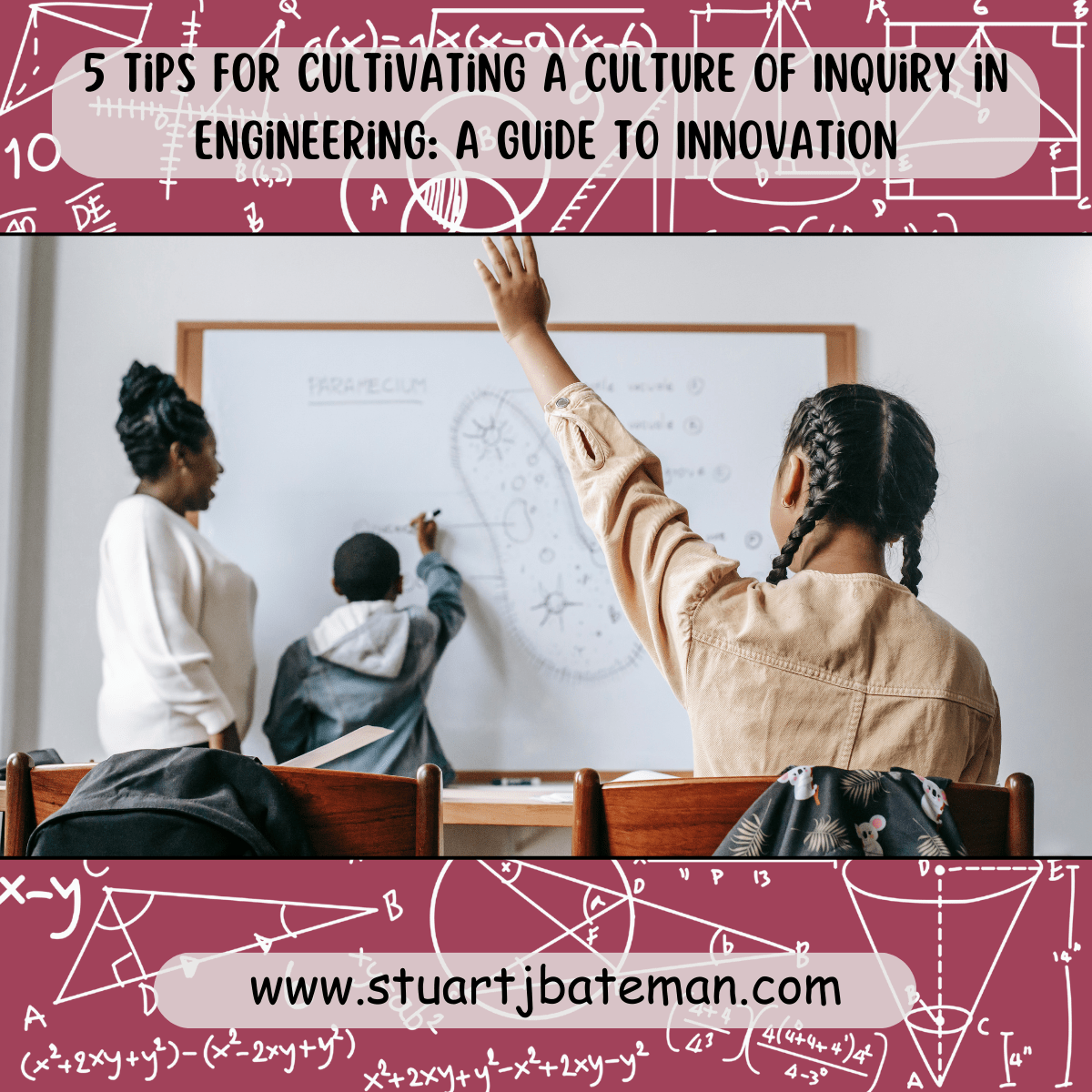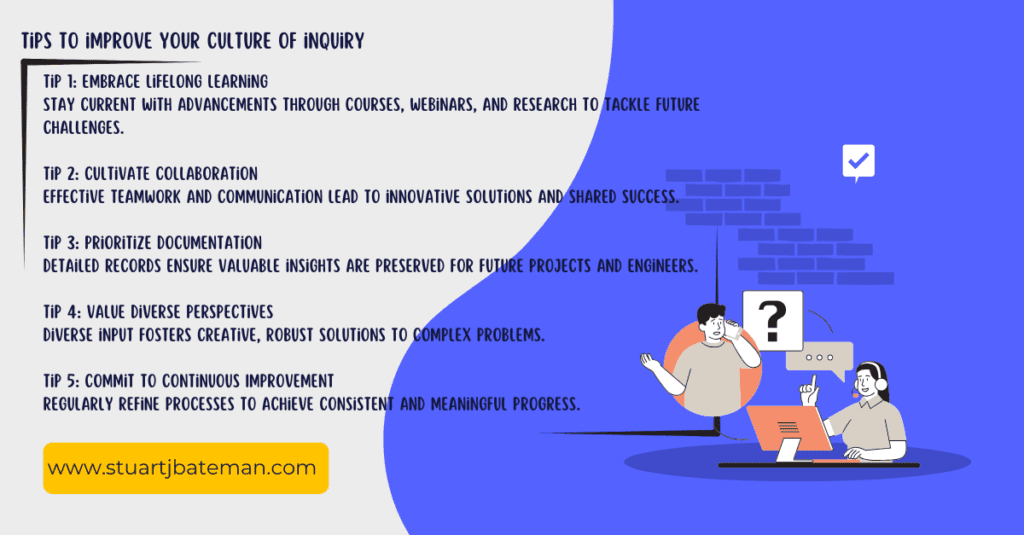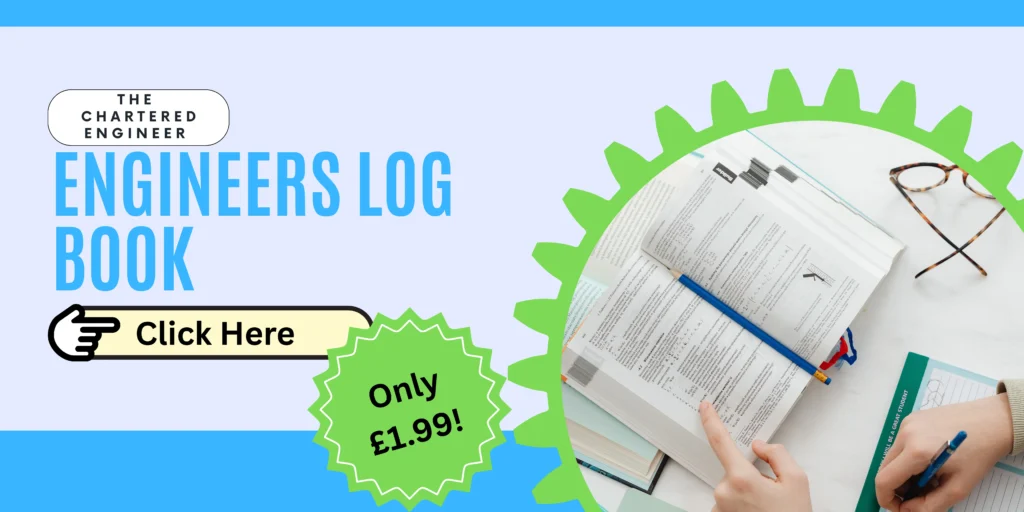5 Tips for Cultivating a Culture of Inquiry in Engineering: A Guide to Innovation
Motivation is overrated — environment often matters more
– Atomic habits

Inquiry in Engineering is essential for everyone.
When I’ve joined a new company or department that isn’t asking enough questions, my first step is to lead by example. Inquiry in engineering often challenges the status quo, which can cause friction, but it’s essential for uncovering root causes, debunking false logic, and eliminating unsupported assumptions.
Without a culture of inquiry, teams stay stuck in their biases or unchallenged perspectives. However, if their logic is sound and works for the project, embrace and learn from it—it’s a valuable addition to your toolkit.
For me, fostering a culture of inquiry isn’t just about engineering; it extends to Sales, Marketing, Manufacturing, and Production. Everyone grows when inquiry becomes a shared value.
But remember—it starts with YOU. Lead by example, and others will follow. Just like in that video where one brave dancer starts at a concert and, within 10 minutes, inspires a crowd to join in!
To thrive in this ever-evolving landscape of industry, we must establish a culture that not only welcomes questions but celebrates them. In this comprehensive guide, we will delve into five invaluable tips that will empower engineers to nurture a culture of inquiry. By doing so, we can collectively push boundaries, drive innovation, and discover ingenious solutions to the most complex problems in our field.
Tips to improve your culture

Tip 1: Embrace Continuous Learning
The engineering realm is a continuous learning journey. Keeping pace with the latest advancements is non-negotiable. Dedicate time to ongoing learning, whether through courses, webinars, or immersing yourself in the latest research papers. Staying at the forefront of your field ensures that you’re equipped with the knowledge needed to tackle tomorrow’s challenges.
Tip 2: Foster Effective Collaboration
Effective collaboration within engineering teams is paramount. Communication, knowledge sharing, and collective problem-solving can lead to innovative solutions that might otherwise remain elusive. Remember, great ideas often emerge when minds collaborate.
Tip 3: Thorough Documentation Matters
Documentation is the backbone of knowledge sharing. Keep detailed records of your projects, including design decisions, calculations, and test results. These records serve as a valuable resource for future reference and ensure that insights gained are passed on to the next generation of engineers.
Tip 4: Seek Diverse Perspectives
Complex problems benefit from diverse perspectives. Actively seek input from colleagues with varied backgrounds and experiences. Different viewpoints often lead to more robust and creative solutions. Embrace diversity within your team.
Tip 5: Promote Continuous Improvement
Continuous improvement is a cornerstone of engineering success. Regularly assess and refine your methodologies. Don’t be afraid to question your own processes. Incremental enhancements in your problem-solving approaches can yield significant long-term benefits.
Why I think this needs to be promoted more
In conclusion, a culture of inquiry forms the foundation upon which engineering greatness is built. By following these five tips — embracing continuous learning, fostering effective collaboration, prioritizing thorough documentation, seeking diverse perspectives, and promoting continuous improvement — we unlock the true potential of our engineering teams.
Let’s celebrate the art of asking questions, explore new horizons, and consistently push the boundaries of what’s possible in our field.



What are your thoughts? Have I covered everything or is there more you know and would like to share?
I’m always learning and improving this site and my blogs, so please feel free to get in touch with me via LinkedIn or this site to discuss any topics I have covered.
If you’re having trouble finding ways to progress check out these sites filled with free learning tools:


Discover more from The Chartered Engineer
Subscribe to get the latest posts sent to your email.